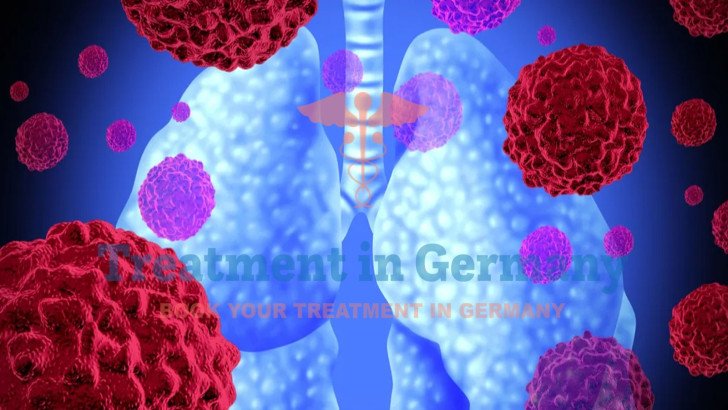
NSCLC accounts for 80-85% of lung cancer cases, with approximately 40,000 annual diagnoses in Germany.
Dendritic cell therapy, a sophisticated cell-based immunotherapy, harnesses the immune system to target cancer cells by leveraging dendritic cells to stimulate T-cell responses. For non-small cell lung cancer (NSCLC), a prevalent and challenging solid tumor, this personalized treatment offers a promising therapeutic avenue. In cancer treatment, it is delivered by expert doctors, including German oncologists, within advanced hospitals.
NSCLC accounts for 80-85% of lung cancer cases, with approximately 40,000 annual diagnoses in Germany. Driven by smoking, environmental exposures, and risk factors like obesity, diabetes, high cholesterol, and autoimmune diseases, NSCLC includes subtypes like adenocarcinoma and squamous cell carcinoma. Early-stage NSCLC has a 60-80% five-year survival rate, but stage IV drops to 5-10%, with 50% of patients experiencing recurrence.
Standard treatments—surgery, chemotherapy, and targeted therapy—often yield limited success in advanced cases, prompting exploration of dendritic cell therapy. Unlike CAR-T cell therapy, which excels in blood cancers, this immunotherapy targets solid tumors, offering 20-40% response rates in NSCLC, per latest research. Hospitals are at the forefront of these innovative cancer treatments.
Dendritic cell therapy activates the immune system through a targeted, multi-step process:
This mechanism, refined in hospitals, positions dendritic cell therapy as a personalized treatment for NSCLC, contrasting with chemotherapy’s broader cytotoxicity.
Clinical Effectiveness for NSCLC
Dendritic cell therapy demonstrates significant potential in NSCLC across various stages:
Compared to CAR-T cell therapy’s 70-90% remission rates in blood cancers, dendritic cell therapy offers more modest but durable outcomes for solid tumors like NSCLC, making it a key component of cancer treatment options.
Safety Profile of Dendritic Cell Therapy
The therapy’s safety is a critical advantage for NSCLC patients, who often endure intensive treatments:
German oncologists implement rigorous monitoring, ensuring safety in hospitals, per latest research.
Integration with Other NSCLC Treatments
Combining dendritic cell therapy with other modalities enhances its effectiveness for NSCLC:
Hospitals design these combinations, optimizing cancer therapy for NSCLC.
Comparison to Other Immunotherapies
Dendritic cell therapy differs from CAR-T cell therapy and other immunotherapies in its NSCLC application:
These differences inform German oncologists in selecting innovative cancer treatments.
Challenges and Limitations
Despite its promise, dendritic cell therapy for NSCLC faces challenges:
Germany’s 120+ annual trials address these hurdles, advancing cancer treatment options, per latest research.
Future Directions for NSCLC Treatment
Research is expanding dendritic cell therapy’s role in NSCLC:
These innovations position hospitals as leaders in innovative cancer treatments.
Conclusion
Dendritic cell therapy is an effective and safe option for non-small cell lung cancer, offering durable immune responses for solid tumors with minimal toxicity. Delivered by German oncologists in premier hospitals, it integrates targeted therapy and complementary therapies to enhance quality of life. As latest research drives progress, this cell-based immunotherapy reinforces Germany’s leadership in personalized treatment for NSCLC.
FAQS
Is dendritic cell therapy effective for NSCLC?
It achieves 20-40% response rates, improving outcomes in cancer treatment for solid tumors.
Who qualifies for dendritic cell therapy?
NSCLC patients with identifiable antigens, assessed by German oncologists for personalized treatment.
Is dendritic cell therapy safe for NSCLC?
Mild side effects like fever are managed by doctors, ensuring safety in cancer therapy
Can it reduce NSCLC recurrence?
It lowers recurrence risk by 15-25%, enhancing quality of life.
How does it compare to CAR-T cell therapy?
More effective for solid tumors than blood cancers, per cell-based immunotherapy research.
Can it be combined with other treatments?
Targeted therapy and radiotherapy boost efficacy, optimized in hospitals
How long does the treatment take?
Spans 2-6 cycles over weeks, tailored by doctors for cancer therapy.
Are clinical trials available for NSCLC?
Yes, trials advance innovative cancer treatments for non-small cell lung cancer.
What are the side effects?
Fatigue and fever, minimized in cancer treatment options, resolve quickly.
Why choose Germany for this therapy?
Germany excels in personalized treatment, led by expert German oncologists and hospitals.
For further details, visit our contact us page.
Kindly complete the form below, and our dedicated team will reach out to you promptly. We look forward to connecting with you soon!
Trierer Straße, 56072 Koblenz, Germany

.webp)
 (1).webp)

.webp)
 (1).webp)


.webp)
 (1).webp)

.webp)
 (1).webp)
